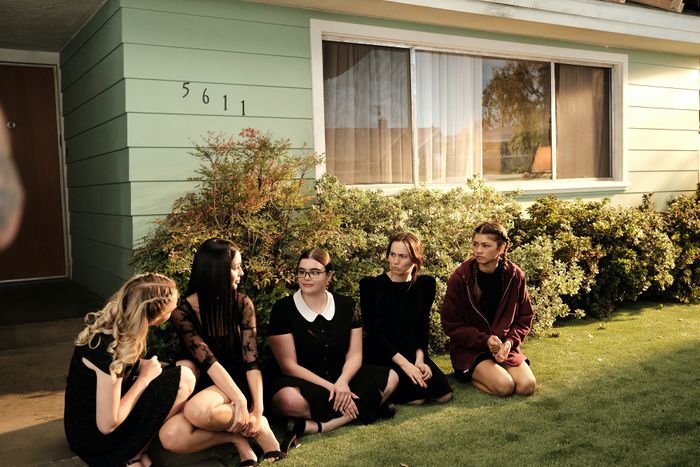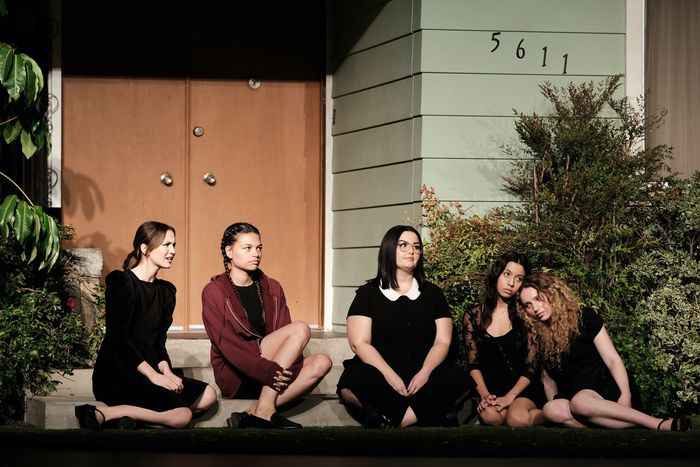
The season-two finale of Euphoria has been heavily criticized on social media for all the things it did not do: Give more screen time to Hunter Schafer’s Jules, address where the hell Rue’s missing suitcase is or whether Laurie the drug dealer still wants her money, let Kat do basically anything. From a plot perspective, Sam Levinson, the show’s creator and sole writer and director during season two, left a lot of questions unanswered.
Messy as it was, though, Sunday’s episode did do at least one thing quite successfully: This finale slyly and deliberately blurred the lines between reality and fiction in a way that underscores the whole point of Euphoria. As I noted in a piece earlier this month, Euphoria is more interested in capturing the emotional reality of being a teenager than the actual reality. That means that sometimes the series shows us things as they are, to a shockingly candid degree, and sometimes it escalates situations to an almost absurd level because, arguably more than at any other time in life, adolescence makes everything feel high-stakes, super-dramatic, and life or death. When you’re young, sometimes it’s hard to distinguish between a genuine crisis and a minor problem because everything feels like a crisis.
The line between what’s real and what isn’t gets blurred in similar fashion throughout “All My Life, My Heart Has Yearned for a Thing I Cannot Name.” The episode is plastered with intense, over-the-top set pieces that seem completely divorced from anything that might happen in a real high school or to actual teenagers, from Lexi’s extremely polished production to the way that Cassie, Suze, and Maddy climb onstage and derail that production. But Levinson also slides in scenes that take their time to an almost hyperreal extent — see and hear that song Elliot sings to Rue for nearly four full minutes. At various points, we, like the audience of Lexi’s play, may justifiably wonder whether what we are seeing is intended to reflect the truth or an exaggerated version of it.
Take the long, heartfelt conversation between Rue and Lexi about how they’ve dealt with the absences of their fathers. It’s a lovely scene, beautifully acted by Zendaya and Maude Apatow, that at first seems to be taking place after the play, therefore hinting that their friendship will be rekindled. Then Levinson pulls the rug out from under the whole thing by immediately showing a version of it through the prism of Lexi’s play. Did the girls really have that talk? Or did Lexi put that interaction in her play because she wishes it would happen but knows it never will?
A similar dynamic plays out during the flashback to Rue’s delivering the eulogy at her father’s memorial. “My first thought was, This feels like a movie,” Rue says of the moment when her dad passed. “I know a lot of people feel that way when traumatic things happen to them. At least I hear that a lot. It didn’t feel real.”
Just as Rue says that line, the perspective of the scene flips, and suddenly we are seeing this eulogy as staged during Lexi’s play, Our Life. The mourners are the actors playing all the people in Rue and Lexi’s orbit. A spotlight shines on Fake Rue as she repeats, “It felt like a movie.” Then the camera pans to Real Rue, who is sitting in the audience, watching a version of herself processing her grief while she’s still figuring out how to do the same thing in real life, as opposed to Our Life.
Several moments in the finale deliberately and pointedly feel, as Rue says, like a movie. The storming of Fez’s house by the police and the massive shoot-out that results in what appears to be Ashtray’s death is traumatic and surreal. It’s also the natural cinematic bookend to the sequence that opens this season of Euphoria, depicting Fez’s youth and his connection to Ashtray as a Martin Scorsese film. Before Cassie walks back into the auditorium and starts screaming at the actors in her sister’s play, the camera lingers on the sight of her outside the door to the theater, breathing heavily onto the glass pane. Everything about this image evokes the spirit of a horror movie, as does her stylized re-entrance into the auditorium, where she saunters aggressively down the aisle, one of her yellow heels stabbing a Playbill lying on the ground. (Side note: What high school is giving out Playbills at its plays?)
While the melee that later ensues could, in theory, take place during a high-school show, it’s hard to imagine it actually happening the way it does here. As if to underline that, the people in the audience immediately become confused, wondering if what they’re watching is real or part of the play. In other words: Is this drama real, or is it just manufactured? If you’re the parent of a teen, or the teacher of teens, or any non-teen who regularly deals with teenagers, you probably ask yourself this question multiple times a day.
The friction between those extremes is especially relevant to what it’s like to be young in 2022, when some teens dump out their deepest feelings on TikTok or Instagram — or, perhaps, on stages at their high schools! — but keep them hidden from those nearest to them. Sometimes people get closer to reality when they’re performing, and sometimes they’re just being performative, and it can be challenging to tell the difference even when you’re the performer. This episode of Euphoria lives within that friction, which, admittedly, can be frustrating to witness. Hey, you know what else is frustrating? Teenagers! (If we’re tagging ourselves in this episode, I’m Suze, shouting “Language!” while my two daughters are about to rip each other to shreds in front of a live audience.)
Does it matter if Our Life, an expression of Lexi’s pent-up feelings in theatrical form, reflects the truth about every life depicted within it? It certainly does to the people she is writing about, who may feel like Lexi’s observations are an inaccurate depiction of their experience, not to mention an invasion of their privacy. But for a teenager like Lexi, and for Euphoria as a series, the most important priority is to convey and provoke feeling.
Midway through the play, after the Cassie/Maddy slap fight, Lexi becomes completely distraught. She’s certain this whole project has been a disaster. Bobbi, her stage manager with the voice of a baby angel, disagrees. “It could be worse,” she says. “It could be boring. I mean, how many shows in the history of East Highland High have started a riot?” Bobbi is essentially saying that the messiness ultimately doesn’t matter, because people will remember the intensity of all that drama and how it made them feel, and that’s what is important. Is she talking about Our Life here, or is she talking about Euphoria? The lines, once again, are blurred.



